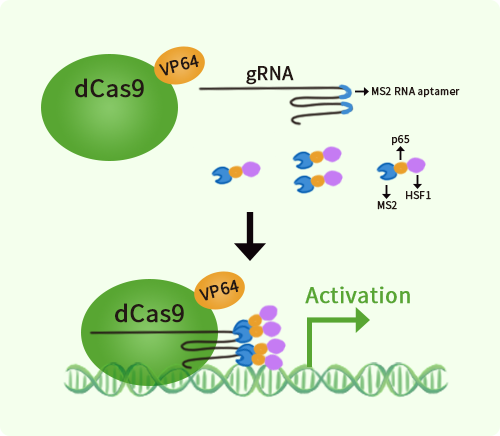Human PGAP3 activation kit by CRISPRa
CAT#: GA114273
PGAP3 CRISPRa kit - CRISPR gene activation of human post-GPI attachment to proteins 3
CNY 12,255.00
Specifications
| Product Data | |
| Format | 3 gRNAs (5ug each), 1 scramble ctrl (10ug) and 1 enhancer vector (10ug) |
| Symbol | PGAP3 |
| Locus ID | 93210 |
| Kit Components | GA114273G1, PGAP3 gRNA vector 1 in pCas-Guide-GFP-CRISPRa GA114273G2, PGAP3 gRNA vector 2 in pCas-Guide-GFP-CRISPRa GA114273G3, PGAP3 gRNA vector 3 in pCas-Guide-GFP-CRISPRa 1 CRISPRa-Enhancer vector, SKU GE100056 1 CRISPRa scramble vector, SKU GE100077 |
| Disclaimer | These products are manufactured and supplied by OriGene under license from ERS. The kit is designed based on the best knowledge of CRISPRa SAM technology. The efficiency of the activation can be affected by many factors, including nucleosome occupancy status, chromatin structure and the gene expression level of the target, etc. |
| Reference Data | |
| RefSeq | NM_001291726, NM_001291728, NM_001291730, NM_001291732, NM_001291733, NM_033419 |
| Synonyms | AGLA546; CAB2; hCOS16; PERLD1; PP1498 |
| Summary | This gene encodes a glycosylphosphatidylinositol (GPI)-specific phospholipase that primarily localizes to the Golgi apparatus. This ubiquitously expressed gene is predicted to encode a seven-transmembrane protein that removes unsaturated fatty acids from the sn-2 position of GPI. The remodeling of the constituent fatty acids on GPI is thought to be important for the proper association between GPI-anchored proteins and lipid rafts. The tethering of proteins to plasma membranes via posttranslational GPI-anchoring is thought to play a role in protein sorting and trafficking. Mutations in this gene cause an autosomal recessive form of neurologic hyperphosphatasia with cognitive disability (HPMRS4). Alternative splicing results in multiple transcript variants encoding distinct isoforms. [provided by RefSeq, Jul 2017] |
Documents
Resources
| 基因表达相关资源 |
Other Versions
| SKU | Description | Size | Price |
|---|---|---|---|
| KN402289 | PGAP3 - KN2.0, Human gene knockout kit via CRISPR, non-homology mediated. |
CNY 8,680.00 |


 United States
United States
 Germany
Germany
 Japan
Japan
 United Kingdom
United Kingdom
 China
China

